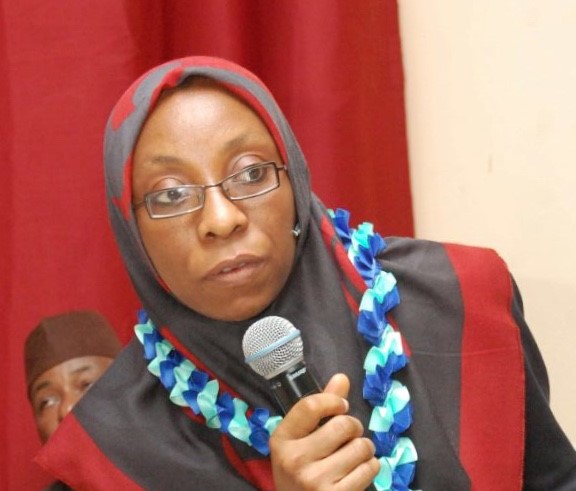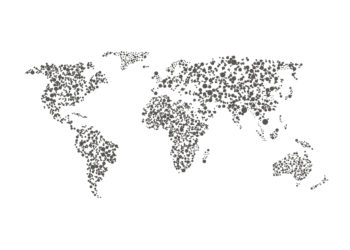In yesterday’s “Ask the Community (and Chefs)” post, librarians and people involved in various ways in journal publishing shared their thoughts about how to increase equity in open research. Today’s responses provide researcher perspectives and reflections on the wider enabling landscape for open access and open research. Please do add your own responses to the question in the comments.

Dr. Zainab Yunusa-Kaltungo, Plastic Surgeon, part-time Lecturer and Hospital Administrator, Nigeria
Open access (OA), open research, open data and all forms of open projects mean unending possibilities for me as a researcher from the global south.
Early in my postgraduate studies, it often was a combination of frustration and disappointment to find that most  articles I need to do a well-researched journal club session or related scholarly training requirements were restricted access and the cost beyond my reach. Sometimes more than 90% of the references in a selected publication are behind a paywall. With the increasing popularity of and drive towards OA I confidently tell my protégés that the days of precious articles behind a paywall are going out of fashion.
articles I need to do a well-researched journal club session or related scholarly training requirements were restricted access and the cost beyond my reach. Sometimes more than 90% of the references in a selected publication are behind a paywall. With the increasing popularity of and drive towards OA I confidently tell my protégés that the days of precious articles behind a paywall are going out of fashion.
So, what are the implications for researchers in the global south?
Conducting research is cheaper, faster and more credible. With open data we can generate high quality research papers, published according to recommended guidelines, in previously unattainable journals, have meaningful well researched journal club discussions, and so much more.
With the coming of such resources as Creative Commons, our institution is rolling out international standard research training courses using using materials shared under the Creative Commons agreements such as research writing materials from AuthorAID [a project of INASP]. This means trainees who’ve gone through the course go into mandatory research methodology courses armed with research knowledge and participate meaningfully.
What I would like to see in the future of open projects is more collaborative participation in true open research with researchers from the global south.
Dr. Ismael Kimirei, Centre Director, Tanzanian Fisheries Research Institute (Kigoma), Tanzania
OA is a great idea if it works for everyone. I mean everyone, in the sense of both access to the materials and publishing OA by all researchers regardless of their affluence. I know it is a dream so great that some may laugh at it. Nonetheless, it is not a sin to dream big. I have always wondered if many advocates of OA are advocating for a complete OA — that works for everyone.
I understand that somehow someone must pay for the publishing costs. And that OA publishing should not be synonymized with predatory publishing; in which case editorial sieves must be tightened and carefully instituted at all levels, and the rigorous peer-review process advocated for and implemented. Unless the publishing process is paid for by professional bodies or from other sources, it is only prudent that some form of processing fees are paid. And of course, before we can access published scientific materials, we first must publish them. And before we get our works published, we first must secure funding, conduct research and write it.
The first imbalance starts with funding. Not all researchers receive enough research funds to provide for publishing their works with some form of OA. It is oxymoronic to think that a researcher with very limited resources can afford publishing their works as OA. The APCs of some OA journals are sometimes nearly equal to the total research budgets of these researchers. With such a trend, I will bet that publishing in OA by researchers in low- and middle-income countries (LMIC) will be next to impossible. Because of lack of funds, these researchers publish in journals where their works are put behind paywalls such that sometimes they cannot access their own works!
Again, it is a dream, if only the distribution of wealth was even or equitable, and that the funding agencies would allow for publishing charges large enough to publish in OA outlets, even for southern researchers! I have heard that some funders in the EU are making it mandatory for funded researchers funded to be published OA. I want to believe that they are also providing an option for paying for the publication fees or should be included in the budget. Another dream is whether the governments in the LMIC could fund research and provide means to pay for OA publications.
Another option would be to ensure that the LMIC researchers collaborate with northern researchers advocating for mutual benefit, and where they are recognized as intellectual equals. This has many benefits, including publishing OA with their northern collaborators. Collaboration has already been shown by Clarivate to positively influence, for example, the number of articles published by researchers from some African countries.
High APCs are partly to blame for many LMIC researchers publishing in predatory journals — some of which charge them very little or lure them by giving them discounts. It would be good if more of the reputable journal publish houses could give these researchers similar discounts or waive the APCs for them entirely. After all, reviewers, who field the most work along the peer-review publishing route do not get paid!
Of course, there is no silver bullet to achieving equitable participation in OA, however, we can start by lowering or waiving APC for OA articles.
Dr. Farooq Rathore, Department of Rehabilitation Medicine, PNS Shifa Hospital, Pakistan
In my personal experience of working with colleagues and students in Pakistan and other LMICs, we like the OA model but usually avoid publishing in OA journals. The major constraint is the publishing cost. Some journals do offer a discount, but honestly, the discounted amount of $300 to $800 USD is still not affordable since very few authors based in LMICs have institutional support and funding to cover the cost of publishing in OA journals.
Joshua Okonya, Research Associate, Crop Protection, International Potato Center, Uganda
Achieving equitable participation in open research [in Africa] would require the willingness of research institutions and funding bodies. Current policies don’t mandate or encourage open research because even in staff contracts, it is clear that any product developed during someone’s tenure is a property of the organization. Institutions need to open up by re-writing their policies and this will take some time to be achieved.
However, if international donor agencies in their calls for research project concept notes or funding proposals can make it clear that the research MUST be open, then it could be achieved in a shorter time period.
Increasing internet access especially in Sub-Saharan Africa would also be great since this can favor real-time online collaboration.
My personal opinion on OA publishing, and specifically for journal articles, is that the west (where most journal publishers are best) and old professors (both in Africa and in Europe) continue to grade students or new staff during recruitment on the Impact Factor of the journals where they have previously published. This mindset continues to trickle down even to young researchers because it makes one proud. For career growth, some of us are forced to target only journals with Impact Factors and, unfortunately, many subject specific journals by major publishers are subscription-based.
Robert Harington, Scholarly Kitchen Chef, Associate Executive Director, Publishing at the American Mathematical Society, USA
In my view, we should consider more carefully the role of governments in stimulating research. We are facing contradictions. On the one hand, there is an inexorable shift to government intervention in a researcher’s ability to perform and publish their research. On the other hand, there is no desire to separate from a free market economy, driven by big business. I am not entirely sure both states can coexist. Open research is a laudable and unassailable goal. The question is not whether open research is a good thing, but what does it mean for researchers, and indeed all those in the research ecosystem including funders, libraries and publishers. In Europe there is an apparent assumption that open research is synonymous with author-pays Gold OA, and that fees for publishing articles should be applied at a granular level. There is an assumption that what is good for one is good for all. In the US, there is sympathy for this view from the administration, but confusion on how to apply these values to reality — there is essentially no money to back it up. A future of open research requires that this be a government priority. Researchers need to be supported in their work through institutions and funders, with the research enterprise being sufficiently incentivized that careers and discovery are baked with openness. Ignoring extremists from all sides for a moment, it seems to me that for open research to become a reality, we need a manifesto — a manifesto that considers all the stakeholders, including a built-in understanding of the value of research, incentives for researchers, and clarity of the costs in the publishing ecosystem. If we continue as is, all we will see is lobbying from those with the loudest voices. Those that just want to do their research, build their careers and publish their work will be left to pick up the pieces.
Judy Luther, Scholarly Kitchen Chef, President of Informed Strategies, USA
To achieve equitable participation in open research requires that readers are aware of relevant research. For those searching for articles, established resources such as Scopus, Web of Science, and Dimensions index journals and published works. In addition to these types of resources, Google Scholar also includes preprints from disciplinary repositories such as arXiv, bioRxiv, and ChemRxiv. Unpaywall and other tools provide coverage of a wider range of open works.
However, with an avalanche of content, who has time to read what is available, let alone search for more. Yet researchers need to keep up with new developments in their field. Recognizing these issues, there are new tools being developed that are designed to expedite a review of content and employ AI to identity and filter content for the reader.
Publishers are employing an expanded array of abstracts designed to enable faster and/or broader consumption. These include graphical abstracts, bullet points on the research results, and summaries written for a wider audience. Google Scholar has implemented Quick Abstracts this year which displays search results in the form of abstracts for easy review on a cell phone, so the reader can select the articles they wish to have saved to ‘My Library’. This capability expedites the selection process and enables it to occur wherever and whenever the researcher has a few minutes to review results. Extending the workflow to mobile devices maximizes the value for all researchers globally.
With emerging technologies becoming more sophisticated, we’re entering a time when we will come to expect that the content we need will find us. Utilizing machine learning, new tools will become smart enough over time to deliver content that matches the interests of the reader. As an example, Atypon is developing Scitrus as a free service that uses AI to deliver content of interest to the researcher. While It is designed to enable publishers deliver their branded content, it confirms where we are headed.
Discussion
11 Thoughts on "Ask the Community (and Chefs): How Can We Achieve Equitable Participation in Open Research? – Part 2"
I’ve been thinking a lot about “personalization” lately, and I have to disagree with Judy — I have concerns that ultimately it will be a bad thing for the research community.
First, it’s unclear if or when such technologies will ever exist. We’ve been fed the promise of personalized publishing for at least a decade now (it was one of the big selling points of semantic tagging of articles way back when). Does anyone know of a practical use that’s been really helpful to researchers that’s in the wild? Mostly, as far as I can tell, it’s all about marketing and advertising.
And we know what all those personalized filter bubbles from Google and Facebook have done to our society. Do we want this for the research world as well? One of the strengths of the way we do research now is the diversity of approaches. We have an enormous number of individual researchers, each of whom approaches a question in their own, unique way. If we instead feed every instance of the discovery pathway through the same algorithm (assuming that like everything else digital, we’ll settle on one particular tool, whether Google Scholar or Meta or whatever), then won’t that greatly homogenize research, reducing the diversity of approaches and eventually blocking progress?
I’d also be concerned about the potential use of these technologies to create a tiered access system for the literature — pay for the literature and get an unbiased discovery path, or get the literature for free and be subject to the whims of the advertisers (or lobbyists or whoever else wants to influence the way research is done).
As my previous postings indicate, I think Judy’s reading is correct to both the possibilities extant and emergent with AI. David’s identification of the pitfalls, many of which can and are being addressed currently, if of sufficient concerns, is being addressed as these programs develop. The potential to approach the old collegial exchange through pre-review postings, author postings and similar ideas is emergent.
What is not being addressed, but needed, is the stranglehold that the traditional publishers have through “impact factors” and similar “certifications” that have become the default measure being used by institutions for promotion/tenure or for awarding grants. As one person on this list has said, “read the article”. Sage advice for peer faculty in one’s own department or to administrators looking for ways to expedite the bureaucratic morass stacked in their database or on their “desk”.
In fact, this is the “Gorilla” wandering across the basketball court. It would be startling if all the comments in this thread, particularly from the fiscally disenfranchised, addressed the question of “why publish”. In many instances the driving force is the demand for a published article, particularly in a medallion journal for graduation, promotion or qualification for other rewards. The plethora of articles, even in the ranked journals, that never have a single citation, questions the rationale for the pressure to get to “print”.
It would be of interest to carry out a “causal analysis” to determine if the publish/perish factor were removed whether there would be a reduction in published articles and a rise in quality or significance.
How can we achieve equitable participation in open research? This is really at least a three questions wrapped into one: How can research itself be more equitably distributed around the globe, how can publishing opportunities become more equitable, and how can we ensure better access to this published research for everyone everywhere? In the scholarly communication community, most of our attention is focused just on this last question. But we also can’t ignore the first two questions. Education and research budgets in most parts of the world can’t keep pace with the US, China, UK, Japan and France, which together accounted for just over 50% of all research papers published between 1996 and 2017 according to Scimago’s country rankings. The big 20 countries (including most of the rest of Europe) accounted for 83% of papers and the big 50 accounted for 97 percent. That leaves 186 countries in the bottom 3% of research paper production. So there’s a systemic inequity here not just in access to research, but in participation and national investment in research capacity at a fundamental level. We are concerned as a community about equitable access to research, but we should also be concerned about equitable opportunity to contribute to research. Some of what we do as a community, therefore, should be to help the World Bank, the World Economic Forum, UNESCO, and other actors in this space encourage more global investment in education, research, and research publishing capacity, and help them sell the economic growth that comes from these investments. Equity in this case is at least a three-way street.
Glenn, I respectfully disagree with your statement: “how can we ensure better access to this published research for everyone everywhere? In the scholarly communication community, most of our attention is focused just on this last question.” I think most of the attention of the scholarly community is focused on identifying superior outcomes. In my experience the questions of equitable participation and access are noted but not given high priority.
I believe Joseph is on target. As with any skill/resource driven activity from sports to education and scholarly publication, it’s the community that sets the standards of “play” or “participation”. As noted for scholarly research, much depends on the level of competencies, access to resources and similar issues Glenn identifies. Working in both the developed and developing world, one sees increasing pressure to “publish”; hence, in many cases the rise in venues including predatory journals and tiers with lower levels of “play”, as in the world of sports, for researchers in both the developed and developing countries. The issue starts with resources at the lowest level of education, globally, and can’t be fully addressed when arriving at the research level.
I’ve been unclear—apologies. Most of the focus of global efforts is on correcting access deficiencies. It’s on the demand side of the equation, not the supply side. Libraries, funders and governments worry about and plan for how to do a better job of improving access; publishers (to your point, Joe) worry about and plan for how to improve outcomes. And many other groups are caught in the crossfire worrying about—and not really able to plan for—how they’ll be affected by change. Maybe the global open effort would be well-served to also focus more attention on improving the supply-side capacity in currently underserved regions. SciELO, for instance, is an excellent example of this—providing outstanding service and support to Latin American research. Take the SciELO model and replicate it in CAMENA, in Sub-Saharan Africa and in SE Asia for starters. Improve the capacity, attention, and service in these regions as one step of this global process to improve open, instead of “just” trying to tie these regions more effectively into current systems. Make sense?
It’s sensible and rational and compassionate, but I don’t think it will move the needle much. You are couching outcomes in terms of inputs. I think there is more to be gained by doubling down on Harvard and Yale, if outcomes are what you are looking for. I am not dismissing the other side of the equation; I am simply saying that superior outcomes, not egalitarianism, is uppermost on most people active in research. Please don’t shoot the messenger.
Robert Harrington said “there is an inexorable shift to government intervention in a researcher’s ability to perform and publish their research.”
That’s pretty strong and linked to no source. How so? Direct controls? Selective funding? Self-editing by authors or their institutional administrators? In many countries or was the remark directed at specific places or fields?
Not sure if you’ve been following the news, but a few minutes searching surfaces these instances you may have missed:
https://www.buzzfeednews.com/article/zahrahirji/trump-interior-limits-science
https://www.nytimes.com/2017/09/09/opinion/sunday/trump-epa-pruitt-science.html
https://www.npr.org/sections/13.7/2017/10/29/560669329/did-the-epa-censor-its-scientists
https://www.sciencemag.org/news/2018/04/china-asserts-firm-grip-research-data
thank you david.
While these references are primarily focused on research within federal agencies (and China), the issue is far more problematic when the funding of academia determines which areas receive support even in the choice of which departments can thrive, much less survive as class/degree offerings not only in the US but within the EU (Bologna reform) and globally and within research oriented institutions, even specific areas. There is a feedback mechanism here- familiar “dragons”.


